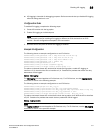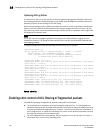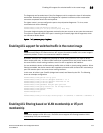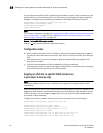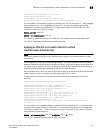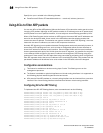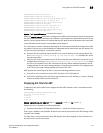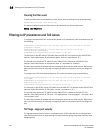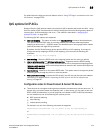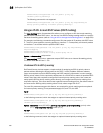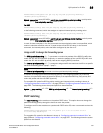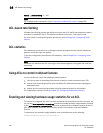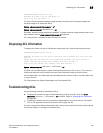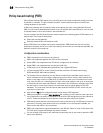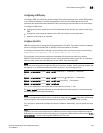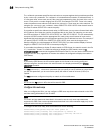
PowerConnect B-Series FCX Configuration Guide 579
53-1002266-01
QoS options for IP ACLs
16
For details about the edge port security feature, refer to “Using TCP Flags in combination with other
ACL features” on page 1202.
QoS options for IP ACLs
Quality of Service (QoS) options enable you to perform QoS for packets that match the ACLs. Using
an ACL to perform QoS is an alternative to directly setting the internal forwarding priority based on
incoming port, VLAN membership, and so on. (This method is described in “Assigning QoS
priorities to traffic” on page 596.)
The following QoS ACL options are supported:
• dscp-cos-mapping – This option is similar to the dscp-matching command (described below).
This option maps the DSCP value in incoming packets to a hardware table that provides
mapping of each of the 0 – 63 DSCP values, and distributes them among eight traffic classes
(internal priorities) and eight 802.1p priorities.
By default, the Dell PowerConnect device does the 802.1p to CoS mapping. If you want to
change the priority mapping to DSCP to CoS mapping, you must enter the following ACL
statement.
permit ip any any dscp-cos-mapping
• dscp-marking – Marks the DSCP value in the outgoing packet with the value you specify.
• internal-priority-marking and 802.1p-priority-marking – Supported with the DSCP marking
option, these commands assign traffic that matches the ACL to a hardware forwarding queue
(internal-priority-marking), and re-mark the packets that match the ACL with the 802.1p priority
(802.1p-priority-marking).
• dscp-matching – Matches on the packet DSCP value. This option does not change the packet
forwarding priority through the device or mark the packet.
• 802.1p-priority-matching – Inspects the 802.1p bit in the ACL that can be used with adaptive
rate limiting. For details, refer to “Inspecting the 802.1p bit in the ACL for adaptive rate
limiting” on page 617.
Configuration notes for PowerConnect B-Series FCX devices
• These devices do not support marking and prioritization simultaneously with the same rule. To
achieve this, you need to create two separate rules. In other words, you can mark a rule with
DSCP or 802.1p information, or you can prioritize a rule based on DSCP or 802.1p information.
You can enable only one of the following ACL options per rule:
• 802.1p-priority-marking
• dscp-marking
• internal-priority-marking
For example, any one of the following commands is supported.
PowerConnect(config)#access-list 101 permit ip any any dscp-marking 43
or
PowerConnect(config)#access-list 101 permit ip any any 802.1p-priority-marking
or



